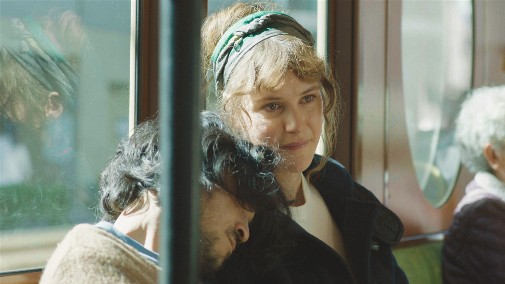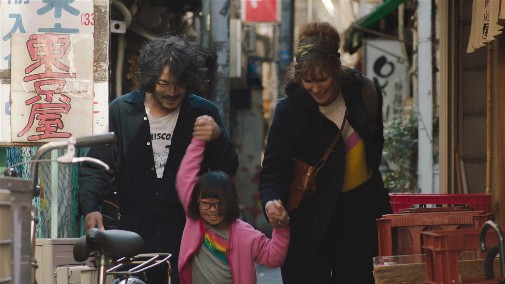Sundance: Falling asleep (and in love) with 'Blood'
 Thursday, January 27, 2022 at 11:58PM
Thursday, January 27, 2022 at 11:58PM 
Bradley Rust Gray's Blood nearly put me to sleep. I mean it in a positive way, despite the negative readings such statements usually entail. At times, it felt like watching a 111-minute ASMR video crossed with a stubbornly understated character study. Even the casting appears designed to induce visceral relaxation, from Carla Juri's whispery intonations to Issey Ogata's unmistakable voice. Gray has devised a film of hypnotic qualities, extrapolating its protagonist's search for inner serenity to the audience's experience of movie-watching. At times, like when a gentle song unfurls with lyrics about dozing off, it almost seems as if Blood is winking at the semi-conscious spectator, sharing a joke, giving permission to dream…
Blood was built around its Swiss leading actress, though the film's true protagonist isn't so much the individual but the environment they inhabit. Juri plays Chloe, a woman who recently lost her husband and is embarking on a work trip to Japan. In the land of the rising sun, emotional insularity expands into a myriad of social and cultural barriers. She doesn't speak the language despite having long-lasting relationships with Japanese friends. Instead of fighting against isolation, Chloe seems happy to let herself drift along, a passive player in the story of her own existence. The camera, too, is glad to observe placidly, allowing scenes to happen organically rather than seeking them out.
Gray's technique owes much to the diarist documentary, working with a cast of professional and non-professional actors who often merely exist in front of the lens. But of course, his more explicit cinematic influences are Hou Hsiao-Hsien and Yasujiro Ozu. Like those masters of audiovisual expression, he asks his audience for patience. Moreover, he begs for surrender, a disconnection from narrative expectation and intellectual analysis. Blood is an invitation for shared meditation, the spectator joining Chloe in her somnambulistic negotiations with grief. This is especially evident as the widow goes in and out of remembrance, dozing off into Iceland-set reveries in the company of a lost paramour.
Short scenes and a lack of chronological signifiers further induce a feeling of temporal displacement, aided by deliberate cutting patterns and a low-key juxtaposition of present tense and dreamed memory. A conversation with a musician friend, Toshi, may slowly fade into a locomotive nap, the sun shining through the train windows unto the character's relaxed visages. Without preamble or warning, the movement leads us to a scene from the past. There's no period separating these phrases, only confusing ellipsis and a continuum of sentiment. Repetition makes these interludes of oneiric grief into a dance. The patient choreography slowly eats away at the mind and spirit until the veneer of peace breaks in cathartic tears.

Though the friendship with Toshi, constantly on the cusp of something more, is central to Blood's meandering structure, the film's themes better resonate within another character dynamic. Throughout the film, I found myself drawn to the bond between the widow and her interpreter, Yatsuro. Issei Ogata's presence in the role may account for that, but there's more to it. As their bond bleeds professional acquaintance into mutual affection, the man becomes a reflection of Chloe's grappling with the unexpected death of a partner. Monologizing about his wife, Yatsuro delivers one of Blood's best scenes, a remarkable instant where Chloe's alienation dissipates, and so does the movie's sense of subjective remove.
Still, it's fair to say this sort of picture won't be for everyone. Checking on reactions across social media and other critics' takes, one's likely to find decries of unbearable tedium and unengaging shapelessness. That's perfectly understandable, a just summation of a lost person's portrait that often seems lost itself. However, the wandering nature of the exercise worked for me, like a soft lullaby lulling me into a sense of serene melancholy. As I watched Chloe try to create new memories, full of joy rather than retrospective bereavement, I felt hypnotized and overwhelmed. Yet, even its sleepiness inspires wonder, an immersive reflection of the widow's headspace.
In conclusion, Blood is undoubtedly imperfect. Notice the recurring flatness of its otherwise pretty cinematography and the vagueness of its psychology. However, there's something beautiful in its conception. You only need to surrender yourself. Or, in blunter, simpler words, Gray's latest is a vibe rather than a narrative film. Do with that what you will. As far as I'm concerned, it works.
 Blood,
Blood,  Carla Juri,
Carla Juri,  Issey Ogata,
Issey Ogata,  Japan,
Japan,  Reviews,
Reviews,  Sundance
Sundance 


Reader Comments (1)
Sounds relaxing as a concept, but maybe it one that will put me to sleep in the end.
Thank you Cláudio for this review, I'll check this one for sure.